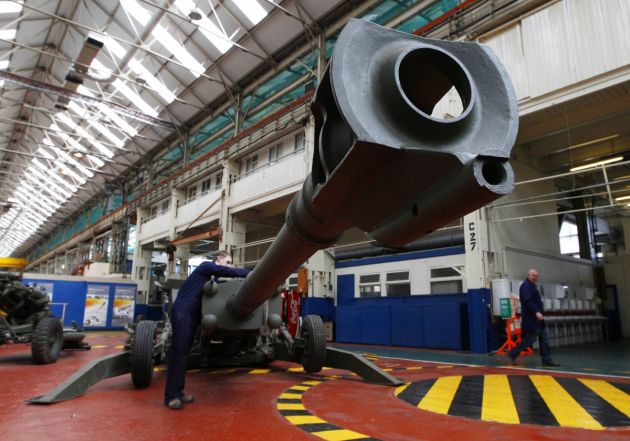UK church decries arms industry as Christian protestors go on trial

Britain's United Reformed Church has expressed sympathy with five Christians who have gone on trial in London for protesting against an arms fair by peacefully blocking an entrance to it.
The Christian protesters super-glued their hands together and held a sit-in outside one of the world's biggest arms fairs when it came to London were charged with trespass, which they denied.
A statement from the URC, the first church to formally express sympathy with those going on trial criticised the UK government's role in the arms trade and called for greater public debate on the issue.
The URC general secretary, the Rev. Roberta Rominger, said, "We concur with the defendants' claim that there is an honourable tradition in the Christian church, going back to Jesus himself, of nonviolent direct action against practices that promote death and injustice."
However, she stopped short of explicitly condoning the actions of the protesters who blocked an entrance to the London arms fair in September.
Rominger said, "If more were known about the kind of weaponry currently being traded, many UK citizens would feel ashamed that their country takes pride in hosting one of the world's largest arms' fairs."
The five defendants, including a trainee minister in the Methodist Church, went on trial in Stratford Magistrates' Court in London on Monday.
Rominger endorsed the comments of the former Archbishop of Canterbury, Rowan Williams, who said the trial should provoke public debate about the UK's role in arms trading.
Williams had said on January 29 that the trial of five should trigger public debate about the UK government's support for the arms trade. The five were arrested in September 2013.
They are charged under the Criminal Justice and Public Order Act 1994 with disrupting a lawful business activity and failing to move when requested to do so by a senior police officer.
NOT GUILTY PLEA
They have all entered pleas of "'Not Guilty."
The maximum penalty is three months' imprisonment, although commentators say that a fine is more likely for the protestors.
Simon Barrow co-director of the UK Christian think tank Ekklesia blogged, "Their action was a principled Christian act of resistance to the murderous global consequences of the multi-billion pound international weapons trade.
Williams, who stepped down in 2012 and is now chair of Christian Aid, a member of the ACT Alliance aid and development group had already offered his support to the defendants.
The former archbishop said, "We still badly need an honest debate about the arms trade - about the kinds of modern armaments that seem to contravene any defensible ethical framework, especially the refinements of anti-personnel weapons which cause most moral scandal."
He noted, "This case has opened up the possibility of such honesty and I hope the chance will not be wasted."
They were arrested in September while kneeling in prayer in one of the entrances to the London arms fair, known more formally as Defence & Security Equipment International (DSEi).
Ekklesia reported that on the same day two companies - MagForce and Tian Jin – were asked to leave the fair for selling illegal torture equipment, although no-one from the companies is thought to have been arrested or charged.
The URC's Rominger said, "We also call on politicians of all parties, and the media, to initiate a wider debate about the manufacture and trade of weapons of death."
The five defendants - Daniel Woodhouse, Chris Wood, Chloe Skinner, Symon Hill and James Clayton - are the first group of a number to be tried for peaceful protests at the 2013 DSEi. Other defendants will go on trial later in February.
The United Reformed Church is one of Britain's largest denominations. It was formed by the merger of the Presbyterian Church of England with the Congregational Union of England and Wales and several smaller groups. It traces its roots back to the 16th century Reformation.
The URC's statement emphasised that the denomination's members, along with other faith groups and civil society, had "campaigned vigorously for greater control of the arms trade."
